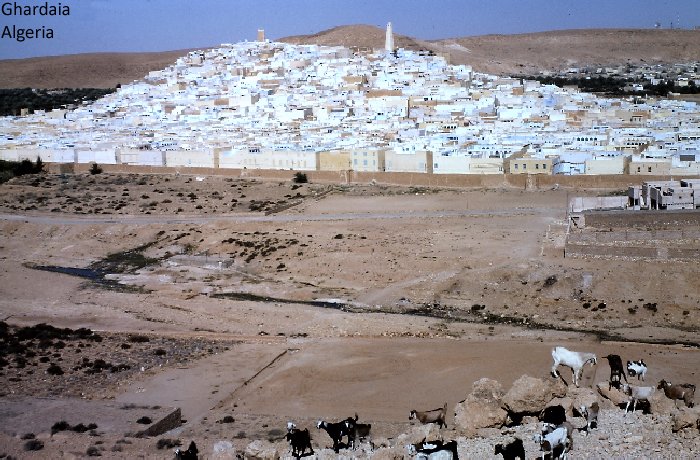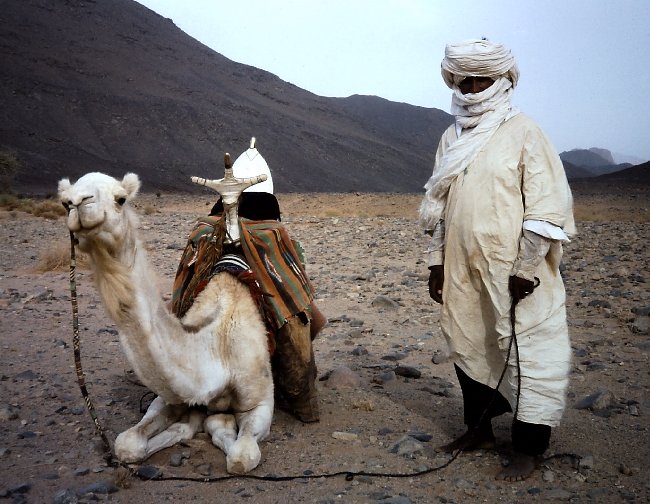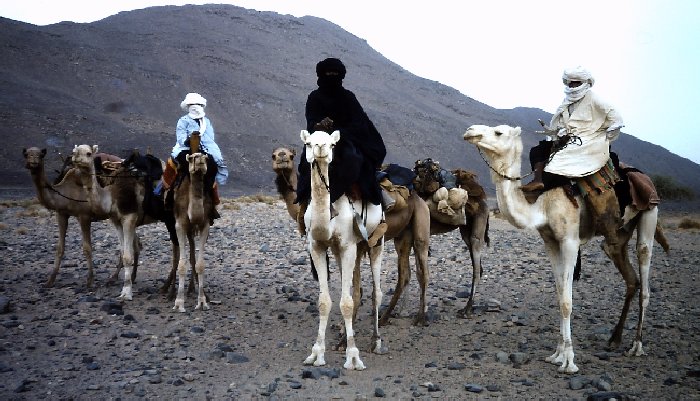
We have stopped in this oasis town (there really are palm trees and houses in the middle of miles of rocky desert) to buy our last fresh vegetables etc. for about 2 weeks. Though the latitude may be equivalent to Sydney, there is a distinct difference in the climate. The day of the week one has to look up, since it is generally irrelevant (except that banks are closed on Thur/Fri). Since it is 0830 hrs we have been on the road for almost exactly 2 weeks.
Thurs, June 2, Tamanrasset! I am lying on a stretcher outside my cockroach-infested bamboo hut in a "hotel", sheltering from the blistering sun, and trying to collect my thoughts in the enervating heat. I think the heat (attenuated by frequent cups of tea laced with cognac!) is speeding up the natural atrophy of my brain. Apart from the fact that it is impossible to write, or even read, on the recent "roads", while jolting along in the back of the truck (and when we stop we seem to be always at work pitching or striking camp, resupplying water or washing up), even when I do have time for writing it's as much as I can manage to maintain a sketchy journal (and then I fall a day behind at that every 5th day when I am on a cooking team). On the other hand, it is also possible that I am simply making excuses for my innate lethargy.

The fact remains that we are all perspiring profusely without really noticing because it is so dry. It is impossible, e.g., to clean one's glasses by huffing on them. We drink a lot and urinate little. The human corpus has its own subtle little ways of letting us know what it needs.
The worst is probably to come the day after tomorrow when we set out for Agadez – 4 days of hard driving (the "road" only marked by cairns every 2-3 km amid a myriad of tracks – nobody drives on the ruinously corrugated main track) with only one place (on the Niger border) where water is normally available.
Today is a "rest" day in this "dry" oasis town – Islam is much more repressive in Algeria than in Morocco: in the northern towns the women, when they are to be seen at all, get around like ghosts with literally only the pupil of one eye showing through their all-white garments; beer and wine are unavailable in most towns (the locals are happy to pay $30 for a bottle of whisky – so much for their hypocrisy) and, where they are, even we can't afford them (in Mascara, beer was $1 for a small bottle). This has not improved the spirits of some of our group, though there have been no serious clashes thus far.
Tam. is about Km 2000 from the coast at Algiers (about 1800 km of desert which we have traversed) and marks approximately the border between Arab and Black Africa (there are lots of blacks around here and I must confess I like them generally better than Arabs – they have a gentler spirit).
Tam is also a focal point for some tribes of Tuareg, a fascinating desert/mountain people, Moslem but not Arab, tall, slim, proud, fine-looking and independent. They were the "original" inhabitants of these desert areas. The "men in blue" ride white camels and dress so that only their eyes are showing. The women (reverse of other Moslems) have an important rôle in society and do not cover their faces. Tomorrow we are to go up into the Hoggar Mountains outside town to see them, hopefully, in their natural setting.


It is now siesta time (c. 1230-1600) and some of our crew have gone off looking for a water-hole, out of town, said to be good for swimming. It may be another hoax, like the "Tuareg festival" some of them were led to last night. The town water-supply is only on from 0800-1100; 1600-2000, so after we arrived yesterday we sat around for two hours with our tongues hanging out, waiting for the first chance in what seemed like eons to wash our lurid bodies and clothes. Some people sold shirts and jeans for "good" Western prices (i.e. about new prices).
At the Poste Restante they gave me a card from... and a letter from... One has to produce one's passport and pay about a local postage stamp to get one's mail in these countries. There are only Arabic newspapers in these places, so for all we know there could be nuclear war going on in the outside world.
It occurs to me that you haven't had any news between Fes and Tamanrasset. In a dusty little wayside market in the backblocks of Morocco I paid about $A3 for a jalaba which stood me in good stead later in the hotter reaches of the desert (about half the price of the tourist traps we were taken into in Fes). We drove past the foothills of the Moyen Atlas mountains amid vast fields of grain which later alternated with sandy, tussocky, deserty soil, in a kaleidoscope of changing landscapes. We camp usually some distance from the road with tents in a semicircle around the truck/trailer and (so far only once) have mounted 2-hour watches throughout the night to discourage sneak thieves (that was in Algeria).
We crossed into Algeria at Oujda after unpacking everything for the officious Moroccans, and met another Encounter Overland truck coming the other way from Joburg. They looked filthy and exhausted and had been deserted by about 5 passengers along the way "for personal reasons". They told of meeting another group (don't know if it was EO) who had such personality clashes they had 2 campfires at night, 2 cooking teams etc. The group we met had had no serious trouble: they saw Vic. Falls from the Rhodesian side; lost 5 hours in a bankup of 40+ trucks in Zaïre when a truck fell down a cliff together with the road; lost another 6 hours and a roll of film when someone took a photo of a train in Nigeria (I think) (in Algeria one does not take a photo even with a soldier or policeman passing in the background); had one fellow spend 1½ days in hospital here in Tam. after some sort of fit. Altogether quite an uneventful trip. As a group, they seemed a bit weirder than us.
After the usual 2-hour border hassle on the Algerian side (and after helping two Australians who without an assured ride to the next town could not get their passports back) we slithered into a bank in Tlemcen at the last minute on Wed p.m. and thus resolved another consuming worry. Thence on through countryside at times fertile and at times suitable for western movies (like Arizona or New Mexico?) Algeria is notably richer (oil etc.) and more expensive than Morocco. The people speak more and better French (more recent colony) but I find them less "sympathiques" than the Moroccans. Their markets are less genuine/interesting with more expensive synthetic junk, more cars, fewer donkeys and women, just as many loungers, more pavement cafés à la française. Men wear baggy skirt-like trousers under their jalabas. Mint tea is good, water ever scarcer towards the South (takes hours to fill up our 50-gal tanks with a dribble of water). After skirting the Atlas Mountains we went up onto the High Plateau and camped amongst the Bedouins, some of whom were very friendly. Even had some rain, and lots of wind all the way.
Started on yucky Nivaquine tabs for further south (why can't they sugar-coat the brutes?) For the last 1500 km almost every time we got off the main road, and after the tarmac ended 400 km ago even on what we took for the main road, we had to use sand-mats and 4WD to unbog ourselves. Saw magnificent sand-drifts (art masterpieces of nature) and even hit one at high speed that had spread across the road, cracking a spring mounting and hurting a number of people. After that we were more careful and ploughed through them in 4WD.
It is extremely dusty, windy and (now) bumpy in the back of the truck. Several hats and maps have not seemed worth stopping for. Those in the back can communicate with the cab according to a code of signals on a buzzer. Many travel with masks like bandits or sheshes like the locals.
In El Goléa (high point) we actually had beer for c. $1.30/small bottle (glasses extra, of course). Had a night visit from a desert-rat, and early on saw a number of storks in their enormous high nests. Took an 80 km detour to a well at Fort Miribel, abandoned but well-preserved outpost of the French army in the middle of nothingness. The good road ends before Arak Gorge which was closed to us because the army is building a sealed road to Tam with the help of hundreds of mistreated Caterpillars (D9s etc.) (significant in left-leaning country!), so we had to take a long and atrociously bad detour.
Drove seven times around the mosque at Maribout to ensure a safe Sahara crossing. Dutchmen we had met did not, and overturned 1 km later and left a $1000 camera by mistake in the sand, realizing only 200 km later. One of them is considering hitch-hiking back.

Now well and truly in the tropics.